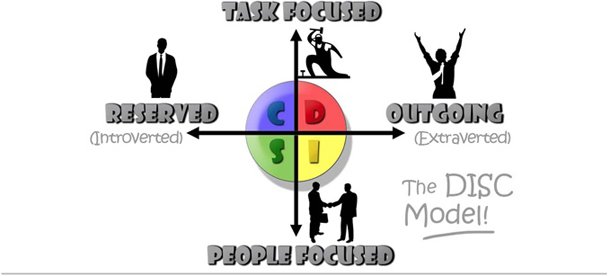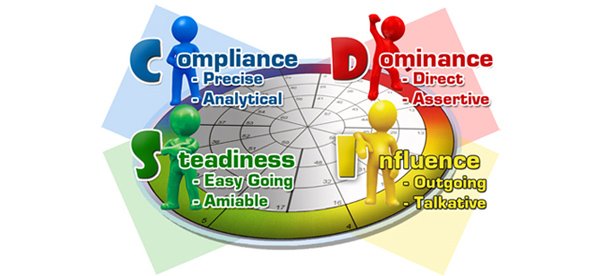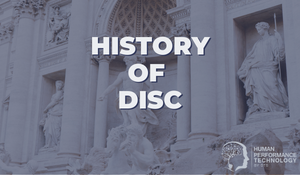DISC Profile: Overview - What is DISC
DISC is the language that is used to describe 4 common behavioural characteristics that are found in all people on earth (regardless of age, gender, race, country or religion).
Research has shown that people, in terms of how they behave and communicate, demonstrate similar characteristics. One person you meet might be talkative, sociable and loud, whilst the next might be quiet, shy and methodical. Consistently, these sorts of characteristics have been grouped into 4 distinct quadrants. Called various names over time (such as Sanguine, Choleric, Melancholic and Phlegmatic), today these 4 traits have popularly become known as 'DISC'.


DISC is the Universal Language of Human Behaviour
DISC is a very simple framework used to articulate the common ways that all human beings tend to act and communicate (it is often described as your 'behavioural style,' or 'communication style').
At a glance, the DISC acronym stands for:
- Dominance: How you approach problems and challenges.
- Influence: How you interact with and attempt to influence people.
- Steadiness: How you respond to the pace of the environment.
- Compliance: How you respond to rules and regulations set by others.
Is DISC a Personality Test?
Not exactly. DISC is not a measure of your complete personality. Claims that DISC measures your personality are a little misleading and this term should be avoided since DISC only measures one aspect of your individuality: behaviour. DISC explores 4 traits within your personality, but the term 'personality' goes far beyond the amplification of these 4 behaviours. For this reason, DISC, although sometimes discussed along-side other inventories such as the Myers-Briggs Type Indicator (MBTI), is not in the same category. DISC is a behavioural assessment tool. MBTI is promoted as a personality inventory, dealing with preferences in how people perceive the world and make decisions.
Am I only 1 of the 4 Factors?
Emphatically, no! It is very important that people are not simply seen as purely 1 factor. It is the intensity of all 4 factors as measured by the DISC assessment that makes each of us different (including both high scoring and low scoring). It is necessary in the beginning to distinguish only 4 factors, however this is only the first step in the process of learning about DISC. People should not be categorised as purely one or the other - they are a blend of the four.
To summarise, DISC is a user-friendly, fun and very applicable common language. Once properly understood, it will lead to improved communication, less conflict and deeper levels of mutual trust. DISC is a simple yet powerful tool to use in developing teams, communication programs, conflict resolution, sales effectiveness, and any other training associated with creating more effective relationships. The ultimate purpose of DISC is to help people improve their Emotional Intelligence (EQ).
More Information:

Theo Winter
Client Services Manager, Writer & Researcher. Theo is one of the youngest professionals in the world to earn an accreditation in TTI Success Insight's suite of psychometric assessments. For more than a decade, he worked with hundreds of HR, L&D and OD professionals and consultants to improve engagement, performance and emotional intelligence of leaders and their teams. He authored the book "40 Must-Know Business Models for People Leaders."

/Disc%20profile_%20The%202%20Disc%20Graphs.png?width=374&name=Disc%20profile_%20The%202%20Disc%20Graphs.png)

We Would Like to Hear From You (0 Comments)